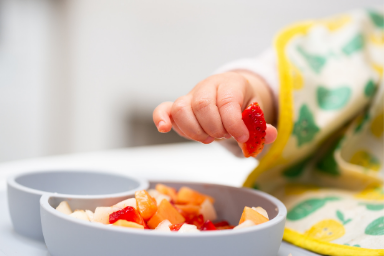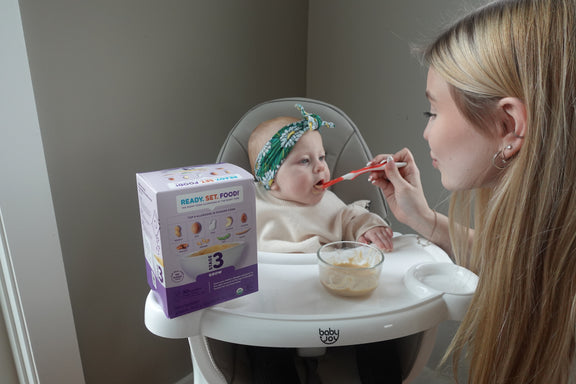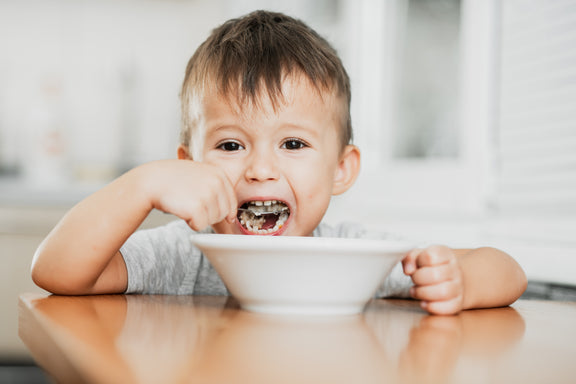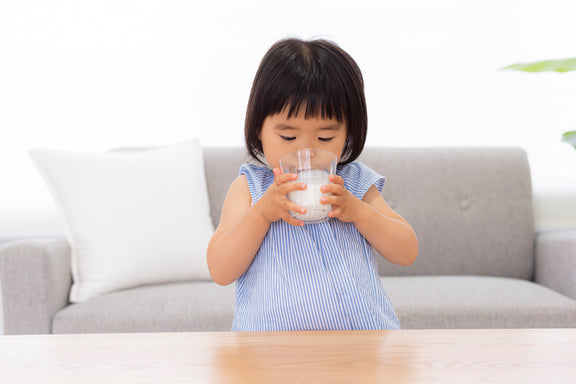Starting solids is an important milestone for baby. These 9 tips will make starting solids easier and safer, and will help make nutritious eating a habit.
Starting solids is an important developmental milestone for your baby. It’s an exciting one for your whole family as well---your baby’s beginning the journey of exploring all sorts of new tastes and textures! These 9 tips will make the transition to solids easier and safer, and help make eating nutritious, diverse foods a lifelong habit for your little one.
1. Know the Signs of Readiness
A baby’s readiness for solids doesn’t automatically come once they’ve reached a certain age or weight.
Instead, determine if they’re ready by watching for developmental cues, like sitting upright with little to no support, holding their head up for longer periods of time, and showing interest in your family’s solid food (like grasping for it).
Also, watch for a change in their tongue reflex. Their tongue should push food to the back of their mouth and swallow, rather than pushing the food out of their mouth.
(For more tips on identifying when your baby is ready for solids, consult this article.)
2. Flavor Variety is the Spice of Life
Weaning is the perfect time to help your baby develop healthy habits and a diverse palate. Babies have more sophisticated taste buds than you might think---they can easily identify differences in flavors.
Exposing your baby to new foods early and often increases the odds that they’ll enjoy those foods later in life, and willingly pick them. So, the more varied the foods you introduce during the first months of weaning, the less likely children are to have picky eating habits as toddlers.
- An NIH study reports that infants are more likely to eat a certain food the more times they are exposed to that flavor.
- It doesn’t matter if you start with sweet or savory foods, as long as you mix things up and keep your choices nutritious.
Conversely, if you don’t expose your baby to a certain food, they’re more likely to reject it later in childhood.
- NIH studies demonstrate that excluding cow’s milk from your baby’s diet reduces the likelihood that they’ll willingly eat milk-focused foods, as late as 10 years of age.
3. Let Baby Explore Different Textures
Introducing a variety of textures is another important step in developing nutritious eating.
- So, think beyond the puree---be sure to introduce lumpy foods, mashed foods, foods that dissolve in the mouth, and soft finger foods as well.
- According to one study, infants who have not consumed lumpy textures before 10 months of age are more likely to be picky eaters later in life.
A few textures, though, should be avoided, to prevent choking.
- Skip harder foods like uncooked carrots, pretzels, and whole peanuts.
Your baby should be able to eat the varied textures in your family’s meals by their first birthday.
- (You’ll still need to cut some foods, such as meat, into smaller pieces.)
4. Consider Baby-Led Weaning
In the baby-led weaning method, you skip feeding your baby runny purees, and offer them a variety of age-appropriate finger foods instead.
- Any softer, cooked food, in pieces that your baby can easily pick up and manage, will do.
- For example, you could introduce ripe banana pieces, cut grapes or strawberries, mango slices, shredded meats, and/or cooked pasta.
- Long, thin pieces are usually easier for baby to grasp, and help prevent choking.
- Avoid hard, raw vegetables and larger, chunkier pieces, as they can be choking hazards.
During this process, baby decides whether they eat the food you’ve given, eats without assistance, and has full control over when to stop eating.
- Thus, baby-led weaning helps your little one build up their fine motor skills, exposes them to more flavors and textures, and teaches them to identify when they are full.
(For more tips on baby-led weaning, check out this article by Whitney Crouch, RDN.)
5. Keep Breastfeeding or Formula Feeding
“Weaning” doesn’t mean that you should stop feeding your baby breast milk or formula. Breastfeeding or formula feeding should remain your baby’s primary food source through their first year of life. Even with their own nutritional and developmental value, solid foods just can’t replace the optimum levels of vitamins and proteins that breastmilk or formula provides.
6. Be Persistent
If your baby doesn’t like a certain food when they’re first exposed to it, don’t give up! It sometimes takes 10 or more tries before baby gets acclimated to, and willingly eats, a new food.
7. Limit Salt, Sugar, and Processed Food
Babies don’t need added sugar or salt in their first foods---that can work against developing healthy eating habits. Babies naturally prefer sweet foods, so it’s easy for them to consume too much of a sugary food if it’s offered.
- Usually, home-cooked and natural foods are your best option, because you can ensure that they don’t have added salt, sugar, or other undesirable additives.
- Plus, it’s easier to give your baby a variety of textures and flavors in the food you make yourself, another key to healthy eating.
- This doesn’t mean that commercial baby food isn’t an option. However, if you go this route, check the ingredient lists carefully to avoid sugar, salt, and other additives. Many brands load their products with these undesirable ingredients.
8. Start (And Continue) Early Allergen Introduction
According to recent landmark studies and pediatric guidelines, early allergen introduction is important.
. Follow these tips to safely and effectively introduce allergenic foods:
- Introduce common allergenic foods (such as peanut, egg, and milk) as early as 4-6 months of age.
- Don’t feed your baby whole peanuts or chunky peanut butter, though, as these are choking hazards. Instead, introduce peanut in another form.
- If your baby has severe eczema, consult your pediatrician before introducing your baby to allergenic foods.
- Only introduce one new food every 2-5 days, in accordance with pediatric guidelines.
- This way, you can better determine whether baby is having an allergic reaction to each new food.
- Be sure that an adult can monitor baby for at least 2 hours after they consume a new food, in case of a reaction.
- Introduce your baby to allergenic foods multiple times a week for several months.
- Feeding baby these foods once or twice is not enough.
- In the landmark clinical studies, infants consumed allergenic foods 2-7 times a week for at least 3-6 months.
- Also, use a stepwise approach, supported by results from one of the landmark studies.
- In this approach, you gradually increase the amount of each allergen that your baby consumes.
9. Follow AAP Guidelines to Introduce Allergens Early (Starting at 4-6 Months) with Ready. Set. Food!
The AAP recommends allergen introduction starting at 4-6 months of age – and the earlier you start, the better chance of healthier outcomes . However, many babies are not developmentally ready for solid food at this early age. And even if they are, it can be difficult to ensure that they consume enough of each allergenic food to build up tolerance. Fortunately, a team of leading pediatricians and allergists have created Ready. Set. Food! – the only allergen feeding system that grows with your baby – to make allergen introduction easier for families like yours.
Start with Stage 1 Mix-Ins:
- Gradually introduce peanut, egg, and milk in the exact amounts used in the landmark clinical studies – you don’t need to worry about figuring out the correct dosage yourself
- Easily mix the packets with breastmilk or formula, so you can start Ready. Set. Food! even before baby is ready for solids
Then, keep feeding baby peanut, egg, and milk with:
- Stage 2 Mix-Ins, which easily mix with breastmilk, formula, or food
- Organic Baby Oatmeal (3 allergens) – the first and only oatmeal with allergens already inside, in Original and Banana flavors (for babies 6+ months)
- Organic Purees – The first and only purees with allergens already mixed inside, in Daniel Tiger Banana Blueberry, Daniel Tiger Apple Banana Carrot, and Apple Peach Cinnamon flavors (for babies 6+ months)
And once baby is ready, add in our Grow products to easily introduce 9 top allergens (add tree nuts, soy, wheat, and sesame along with peanut, egg and milk):
- Stage 3 Mix-Ins, to mix with baby’s favorite foods (for consistent solid eaters 6+ months)
- Organic Baby Oatmeal (9 allergens), the first and only oatmeal with allergens already inside (for consistent solid eaters 6+ months)
Plus, after your little one’s chewing a variety of textures, they can enjoy delicious snacks with a purpose from our Thrive stage:
- Organic Puffs: Maintain exposure to 9 top allergens (8+ months)
- Organic Oat & Fruit Bars: Maintain exposure to 8 top allergens (12+ months)
All of our Ready. Set. Food products are organic and unsweetened, with no artificial additives. Give your baby the best chance at food freedom with Ready. Set. Food!

The Window Of Opportunity For Introducing Peanut: New Study Findings From the LEAP and EAT Trials
Results from the landmark LEAP and EAT studies have shown that intr...

Best Finger Foods For Babies (And When To Start Finger Foods)
When to move beyond the spoon and start baby's journey with finger ...

6 Reasons Why You Should Introduce Allergens
Landmark studies and medical guidelines recommend that you introduc...

7 Ways to Feed Your Toddler More Iron
Iron is an essential mineral for your toddler’s brain health and ov...

How To Know If My Toddler Is Getting Enough Protein?
Protein supports your toddler’s growth, helps build strong bones an...

How Much Milk Should Your Toddler Drink?
How much milk should your toddler drink in a day? Find out the reco...
All health-related content on this website is for informational purposes only and does not create a doctor-patient relationship. Always seek the advice of your own pediatrician in connection with any questions regarding your baby’s health.
These statements have not been evaluated by the Food and Drug Administration. Products are not intended to diagnose, treat, cure or prevent any disease. If your infant has severe eczema, check with your infant’s healthcare provider before feeding foods containing ground peanuts.







